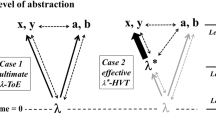Abstract
In this paper, I will show that the Miracle Argument is unsound if one assumes a certain form of transient underdetermination. For this aim, I will first discuss and formalize several variants of underdetermination, especially that of transient underdetermination, by means of measure theory. I will then formalize a popular and persuasive form of the Miracle Argument that is based on “use novelty”. I will then proceed to the proof that the miracle argument is unsound by means of a mathematical example. Finally, I will expose two hidden presuppositions of the Miracle Argument that make it so immensely though deceptively persuasive.
Similar content being viewed by others
References
Carrier M. (1991) What is wrong with the Miracle Argument?. Studies in the History and Philosophy of Science 22: 23–36
Earman J. (1992) Bayes or bust? A critical examination of Bayesian confirmation theory. MIT Press, Cambridge
Harker D. (2008) On the predilections for predictions. British Journal for the Philosophy of Science 59(3): 429–453
Hempel, C. G. (1965). Aspects of scientific explanation. In: Aspects of scientific explanation and other essays in the philosophy of science (pp. 331–496). New York: Free Press.
Leplin J. (1997) A novel defense of scientific realism. Oxford University Press, Oxford
Lyons T. D. (2002) Scientific realism and the pessimistic Meta-Modus Tollens. In: Clarke S. P., Lyons T. D. (eds) Recent themes in the philosophy of science: Scientific realism and commonsense. Kluwer, Dordrecht, pp 63–90
Lyons T. D. (2003) Explaining the success of a scientific theory. Philosophy of Science 70: 891–901
Lyons T. D. (2006) Scientific Realism and the Stratagema de Divide et Impera. British Journal for the Philosophy of Science 57: 537–560
Musgrave, A. (1999 [1988]). The ultimate argument for scientific realism. In: Essays on realism and rationalism (pp. 52–70). Amsterdam: Rodopi. (originally in Robert Nola (Ed.) (1988). Relativism and realism in science. Dordrecht: Kluwer Academic, 1988).
Psillos S. (1999) Scientific realism: How science tracks truth. Routledge, London
Putnam, H. (1975). Mathematics, matter and method philosophical papers (Vol. 1). Cambridge: Cambridge University Press.
Quine W. V. O. (1951) Two Dogmas of empiricism. The Philosophical Review 60(1): 20–43
Severo R. (2008) “Plausible insofar as it is intelligible”: Quine on underdetermination. Synthese 161(1): 141
Sklar L. (1975) Methodological conservatism. Philosophical Review 84(3): 374–400
Stanford P. K. (2000) An antirealist explanation of the success of science. Philosophy of Science 67(2): 266–284
Stanford P. K. (2006) Exceeding our grasp: Science, history, and the problem of unconceived alternatives. Oxford University Press, Oxford
Stanford, P. K. (2009). Scientific realism, the atomic theory, and the catch-all hypothesis: Can we test fundamental theories against all serious alternatives? British Journal for the Philosophy of Science.
van Fraassen B. C. (1980) The scientific image. Clarendon, Oxford
van Worrall, J. (1985). Scientific discovery and theory-confirmation. In J. C. Pitt (Ed.), Change and progress in modern science (Vol. 1 pp. 301–332). Dordrecht: Reidel.
Worrall J. (1989) Fresnel, Poisson, and the White Spot: The role of successful predictions in the acceptance of scientific theories. In: Gooding D., Pinch T., Schaffer S. (eds) The use of experiment: Studies in the natural sciences. Cambridge University Press, Cambridge, pp 135–157
Author information
Authors and Affiliations
Corresponding author
Rights and permissions
About this article
Cite this article
Hoyningen-Huene, P. Reconsidering the miracle argument on the supposition of transient underdetermination. Synthese 180, 173–187 (2011). https://doi.org/10.1007/s11229-009-9600-2
Received:
Revised:
Accepted:
Published:
Issue Date:
DOI: https://doi.org/10.1007/s11229-009-9600-2




